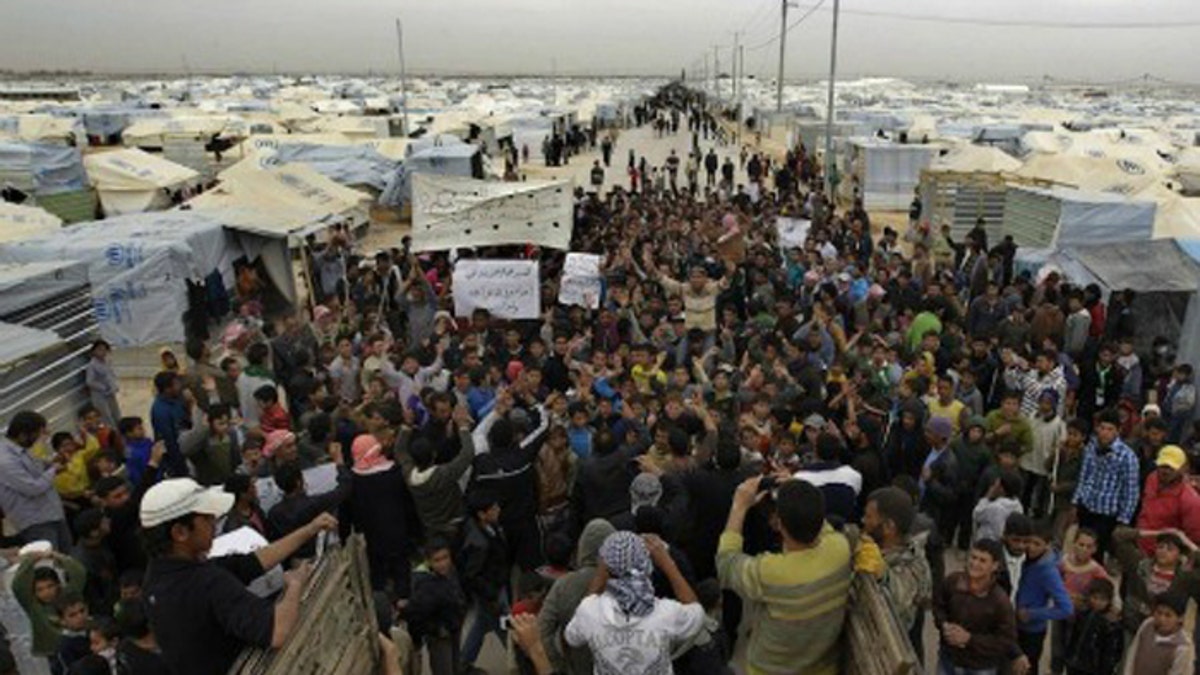
An estimated 500,000 Syrian refugees have fled to camps in Turkey. (AFP)
JARABULUS, Syria – The man’s face was badly mangled and he was unconscious when fellow Syrian rebels brought him on a gurney from the outskirts of this small village across the border to the neighboring Turkish town Karkamis.
His name and prognosis were not clear, but what was known was that he was a casualty of his own comrades - a victim of the infighting among Syrian rebel groups which is also taking a bloody toll on refugees displaced by the more than two-year-old civil war. Freedom-minded Syrian rebels point their fingers at Al Qaeda-linked Islamic State of Iraq and al-Sham, known by the acronym ISIS, which earlier this month announced a campaign of “cleansing evil” directed at moderate pro-Western opposition groups.
[pullquote]
“We are with the moderate fighters and Free Syrian Army," Amer, a 22-year old refugee living in the Kilis Syrian refugee camp on the Turkish-Syrian border, told FoxNews.com. "We are not with the extremists.”
Ibrahim, a truck driver in Syria before fleeing the fighting, said the foreign fighters, initially welcomed in the quest to topple Syrian dictator Bashar al-Assad, have changed the focus to Islamicization of the war-torn country.
“What is happening on the other side is not right,” Ibrahim said.
In conversations with FoxNews.com, dozens of Syrian refugees expressed their frustration with the international community’s failure to oust Assad, a failure they say led them to make a deal with the jihadists now turning on them.
At Kilis, hundreds of refugees, most of whom are families with young children living in a garbage-infested camp, are part of a mushrooming humanitarian crisis in the region. Roughly 500,000 Syrian refugees have fled to neighboring Turkey.
The lack of more direct U.S. and European involvement has led some moderate anti-Assad groups to coalesce around hardline Islamic groups and the al-Qaeda-linked Jabhat al-Nusra front. The U.S. has designated al-Nusra as a terrorist organization.
A new 13-member formation calling itself the Islamic Alliance announced on Tuesday its decision to cut ties with the Syrian National Coalition. The Islamic Alliance declared its intention to build a state based on Islamic Sharia law. It would be a powerful setback for the U.S. and the Syrian National Coalition—an exile political organization for Syrians—if the rebel groups who have connections or affiliations with the pro-Western Free Syrian Army remain committed to the radical Islamic program of the new group.
The presence of an al-Qaeda organization cooperating with Western-backed groups could endanger funding and aid to overthrow Assad’s regime. Reports showed that ISIS tried to expel a German-Syrian physician. The moderate Northern Storm Brigade came to the doctor's aid and violent clashes ensued. It is unclear what happened to the physician.
Ali, a Syrian refugee who studied in Aleppo – a major trade and industrial city just south of Azaz – told FoxNews.com that travel from Gaziantep, a large Turkish city roughly 90 minutes from the Turkish-Syrian border, to Aleppo has become too risky because of the Al Qaeda presence in the area.
The fragmentation of the Syrian opposition—and the move by ISIS to impose a radical Islamic regime on territory in the northern Syria—will continue to complicate the U.S. and EU-backed policies of changing regimes. Middle East analysts see Assad’s regime—and his principal allies—Russia, the Lebanese militia Hezbollah and the Islamic Republic of Iran—growing in strength because of Western inertia and a dangerously chaotic Syrian rebellion movement.
Benjamin Weinthal is a FoxNews.com contributor and fellow at the Foundation for Defense of Democracies.
Follow Benjamin on Twitter@BenWeinthal
